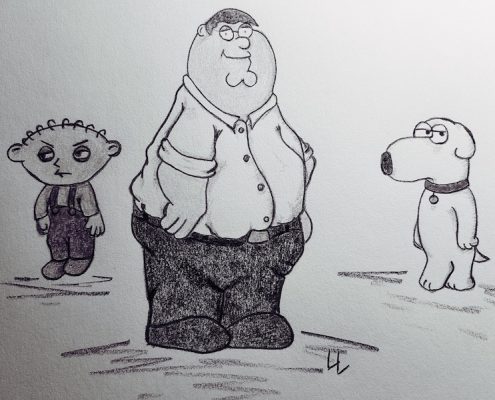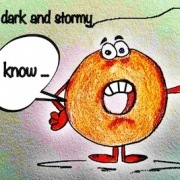How to Write Micro-Fiction: The 200-Word Short Story
Writing a complete story in exactly 200 words can be a bit of a challenge, especially when the stories must contain a beginning, middle, and end. After all, that’s sort of what makes a story out of a grouping of individual words, right?
The trick is to arrange those 200 words into an order that makes them pleasing to our eyes, ears, brains, emotions, and our hearts. In other “words” (pun intended), readers want to feel what they read.
So what’s the best way to get started on these micro creations? Easy answer. You need a subject/topic/story.
Small ideas
Keep the idea small. A BIG story can be far too convoluted to cut to a maximum goal of, say, 200 words, such as the word count for the wildly popular Golden Donut Short Story Contest.
You’ve often heard me speak of police officers needing to avoid tunnel vision and that need is for a few reasons, safety being number one. Number two is to avoid missing any and all details, including details that may later prove to be unnecessary to the case.
The opposite is true when writing flash fiction. Writers need a dose of tunnel vision to help them complete their word-challenged stories. Keeping on the blinders, focusing mostly on the end, helps to avoid the use of unneeded words.
The inspiration
No inspiration? No ideas? Brain as empty as a California lake in the summertime? Easy answer.

Use a photo prompt
For inspiration, pick a photo from your last vacation. Maybe you saw a cool image on someone’s website, the newspaper, a blog.
Okay, you have an idea for a story. What’s next? Again, easy answer.
Where to start?
What about starting in the middle of the story, where the character’s conflict begins, avoiding the use of backstory, flashbacks, prologues, and other filler. Why do this? You don’t have the space for it for one thing. Every single word must count when writing flash fiction. This is even more crucial with writing micro-flash fiction. Shorter paragraphs helps when editing.
Write
This, however, is not the time to worry about the word count. Simply write the story and let the words flow. You can trim later.
Emotion
You absolutely must make your readers feel … something. It is up to you to decide what that something truly is. But whatever you select, be sure to keep it simple. There is not enough space to branch out too far, so pick a couple of focus areas and perhaps start out having your readers experience one feeling at the onset but end with a different emotion altogether. Their rollercoaster ride will be worth your effort. But DO NOT go overboard. This is not the place for emotion that doesn’t remain within the boundaries of your tunnel vision-esque story.
Characters
 One or two are all that’s needed. Any more and the dialog could become confusing. Besides, too many names eats up word count like watching videos on a crappy wireless data plan chews up precious minutes. The same is true with dialog. A family of twelve all talking to a homicide detective who’s barking out orders to a 10-person CSI team along with four other detectives could wipe out the entire word count in a single, unimportant scene.
One or two are all that’s needed. Any more and the dialog could become confusing. Besides, too many names eats up word count like watching videos on a crappy wireless data plan chews up precious minutes. The same is true with dialog. A family of twelve all talking to a homicide detective who’s barking out orders to a 10-person CSI team along with four other detectives could wipe out the entire word count in a single, unimportant scene.
Keep in mind that your story and/or characters may develop a different appearance than the one in your mind when you first sat down to write.
Character Arc
Sure, your tale is only 200 words in length (or 50 or 1,000), but your character absolutely must grow within that confined space.
Subplots
Skip them. there’s no room. Stick to a main theme.
 SHOW, SHOW, SHOW!
SHOW, SHOW, SHOW!
This goes without saying. SHOW the action in your story. Don’t tell us. For example:
“They jumped until they quit.”
The line is a bit vague. It tells us something, but it’s extremely uninteresting. How about …
“Tom and Nancy played a game, seeing who could hop up and down the longest. Tom lost.”
I know. Not the best writing in the world, but you get the idea.
Beginning, Middle, End, and CONFLICT!
Writing flash fiction is not an excuse to cut corners. Each story must have a beginning, middle, and end (a twisted ending is sometimes a nice surprise). And there must be conflict and story resolution. We must feel the struggle (be it internal or external) and then we must see relief (emotional or physical) from that conflict.
Title
The title of a work of flash fiction is extremely important (especially if it’s also part of the word count). It’s the hook. It must cause the reader to stop in their tracks to read your story. It must be THAT compelling. But do not allow it to be so doggone good that it gives away the entire story.
Okay, you’ve finished your masterpiece. What next?
 Edit
Edit
Now’s the time to break out the carving knives and go to work trimming all the fat. Why? Because your 200 word tale comes in somewhere the other side of 100,000 words. Why? Because you love to hear yourself write. You love your fancy-smancy words and you love your voice and your story was absolutely far too good to tell in only … 200 words???
Okay, with red pen sharpened it’s time to cut all the “LY” words and the other stuff you don’t need.
For example, Billy needs to let his mother know he’ll be late coming home after school. That’s all she needs to know to help our story advance. So we, a group of unapologetic flowery writers, write.
Billy picked up the black phone, the one with the blue buttons and the $200 screen protector, and used it to call his mom, a server at Pete’s Possum Gut Gourmet Diner and Horse-Shoeing Parlor, to tell her that he’d be late coming home after school because he wanted to play ball with 12 or 15 of his friends at the church lot over on Elm.
Well, we know a lot about Billy, his mom and his friends and the area. But how much information do we really need to get the point across? How’s this?
Billy called his mom to say he’d be late for dinner.
69 words in the first sentence. 12 in the latter.
Words to lose – the space wasters.
These words are very nice words. I like them a lot. They’re amazing, good, incredible, and just plain uniquely and totally and pleasantly perfect. But avoid them if at all possible. You don’t need them. They’re space wasters.
Say NO to:
a lot
absolutely
actually
amazing
basically
essentially
funny
given the fact that
good
hopefully
incredible
just
kind of
literally
many
nice
perfect
perhaps
pleasant
pretty
probably
quite
really
so
sort of
suddenly
totally
truly unique
usually
very
And other words ending in “LY.”
Now You’re Ready …
to enter the Golden Donut Short Story Contest and win the Golden Donut Award and FREE registration to the 2018 Writers’ Police Academy (prize value is well over $400). Submission deadline is July 2, 2017. This is a FUN contest!!
Here are some of the stories (and a photo prompt) from past contests.













I’m sending everyone who tells me, “I’d like to write a short story” to this article! Great tips.